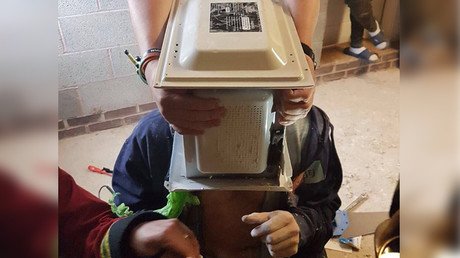Rare ancient artifact proves the Romans were the original pranksters

What have the Romans ever done for us? Well, besides water systems, straight roads and central heating, the discovery of the Tantalus bowl now suggests they were the masters of cracking good jokes.
The function of the Tantalus bowl, which soaks whoever drinks from it in wine, was only fully realized after it was studied by an archaeologist from the British Museum. The bowl was uncovered in Vinkovci, eastern Croatia, in March 2012, and is believed to date back to the 4th century AD.
The silver object is a testimony to how, despite being regarded as one of the most sophisticated societies in the history of human civilization, the Romans were also a total bunch of jokers.
“This is the earliest example of a physical practical joke, certainly for the Romans,” said Dr Richard Hobbs, curator of Roman Britain at the British Museum.
The scenario imagined is that of the bowl being passed to the diners, who, unaware of the prank, would happily take it in their hands for a sip. They would recognize the minute statue of Tantalus, a Greek mythological figure eternally condemned to stand in a lake full of fruit, but without being able to satisfy his thirst or hunger.
Little did the guests suspect, however, that the statue contains a pipe which causes liquid to drain from the bottom directly into their laps. You’ve been punked, Roman-style.
“You can imagine this being passed to an unsuspecting dinner party guest who likes their drink and them holding it and telling a slave to fill it up with wine, and at some point it pouring all over them,” he said, according to the Times.
Dr Hobbs, who co-authored a paper featuring the vessel for the Journal of Roman Archaeology, said a feasible theory is that the bowl was owned by one of two Roman co-emperors, Valentinian I and his brother Valens, who were born in Vinkovci.
The original bowl, understood to be the first known example of a ‘greedy cup’, is being kept at a museum in Zagreb, but Hobbs asked for a replica to test whether the siphon would have actually worked.
This isn’t the first time those Roman jokers delivered a punchline for the ages.
In fact, one favorite joke of contemporary times can be attributed to the Romans, despite being wrongly credited to former Conservative minister Enoch Powell. It’s the one about a chatty barber who asks his customer how he would like his haircut. The customer replies tersely: “In silence.”
Professor Mary Beard, who presents BBC history programs, said: “What almost everybody failed to realize – but I’m sure Powell knew because he was one of the world’s best classicists – that joke is actually from the Roman joke book, absolutely the same.”

















